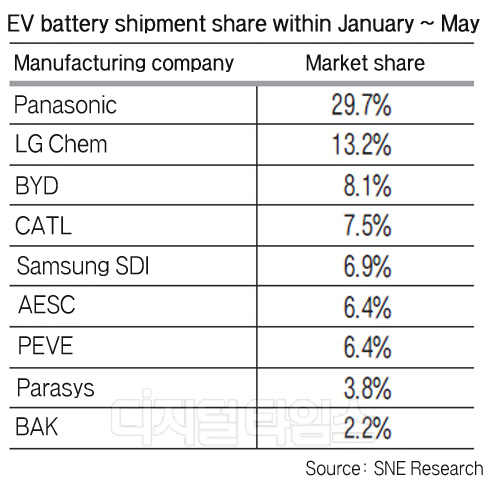THAAD retaliation, strict battery regulation in China and new opportunities in Europe
Park Seul Gee | seul@ | 2017-08-01 10:35:47

The Korean battery industry is rushing to mass-produce production plants aimed at the European market instead of China, which has been hindered by China`s THAAD (high-altitude missile defense system). The Chinese government`s battery regulation issue, which showed signs of solving the problem with the government`s entry into the market, is in a state of rest and is securing a foothold in the European market.
According to the battery industry on July 31, LG Chem has recently completed a battery plant for electric vehicles in Poland and will start mass production from early next year. The company started to supply samples to European car makers. Originally, LG Chem plans to complete the plant investment in Poland by the end of next year. LG Chem secures battery production capacity for about 280,000 electric vehicles in Korea, China, the US and Poland.
Earlier, Samsung SDI also completed a battery plant for Hungary`s electric car in May, one-quarter earlier than planned, and began mass production in the second half of next year. Samsung SDI has built a triangular production system capable of producing 150,000 EV batteries per year, including 60,000 units in Ulsan, 40,000 units in Cyan, and 50,000 units in Hungary.
Meanwhile, SK Innovation has also achieved a 60% rate of completion at the Seosan 2 plant, which includes battery production facilities 4, 5 and 6. The completion date of the project was earlier than planned in the first half of next year.
"We are going to expand capacity at a faster rate than expected," the company representative said. "We will complete the construction period in a timely manner, in line with the start of supply for Europe, which will start in earnest next year."
SK Innovation plans to build a new battery plant with a capacity of 3GWh in Europe, including Eastern European countries such as Hungary and Czech Republic, and plans to build a battery cell this year from 2H12. "It is difficult to tell the progress of the European plant, but the investment and expansion of the EV battery business is going smoothly," a company official said.
The Korean battery industry is expected to help speed up the establishment of a battery production plant for the European market and to ease the difficulties in the Chinese market. Previously, China`s Ministry of Information and Communication (KCCI) issued six car subsidy lists this year, but excluded vehicles equipped with batteries produced by domestic battery manufacturers each time.
An expert from the battery industry stated, "Although the Chinese government is going to provide subsidies for electric cars by 2020, we have to find solutions to other regions before then.
By Park Seul Gee seul@
